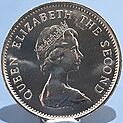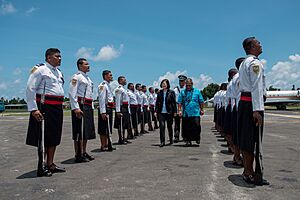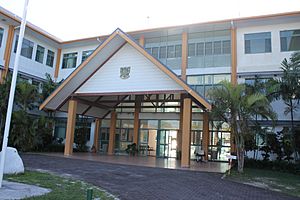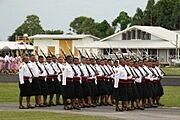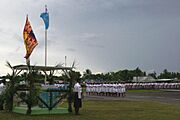Monarchy of Tuvalu facts for kids
Quick facts for kids King of Tuvalu |
|
|---|---|
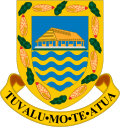
Coat of arms of Tuvalu
|
|
| Incumbent | |
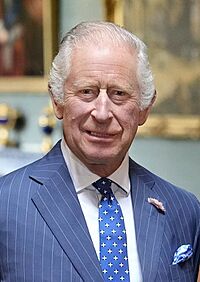 |
|
| Charles III since 8 September 2022 |
|
| Details | |
| Style | His Majesty |
| Heir apparent | William, Prince of Wales |
| First monarch | Elizabeth II |
| Formation | 1 October 1978 |
The monarchy of Tuvalu is a special way of governing where a monarch (a king or queen) is the official head of state for Tuvalu. This role is passed down through families. Since September 8, 2022, King Charles III has been the monarch of Tuvalu.
He is seen as the living symbol of Tuvalu's government, known as the Tuvaluan Crown. Even though King Charles III is also the monarch for 14 other independent countries in the Commonwealth of Nations, each country's monarchy is separate. This means he is officially called the King of Tuvalu. He and other members of the royal family do public and private duties for Tuvalu. However, only the King has a real role in Tuvalu's laws.
The King holds all the main power, but most of it is used by elected members of parliament and government ministers. For new laws to be made, the King's approval is needed. Some powers, like firing a prime minister, are very important but are only used in special situations. They act as a safety measure for the country.
The Constitution of Tuvalu says the King represents Tuvalu's unity and identity. The monarchy helps make sure the government runs smoothly and protects against anyone misusing power. While the King has some unique powers, most of his daily duties are carried out by his representative in Tuvalu, the Governor-General of Tuvalu.
Contents
How the Monarchy Started in Tuvalu

Europeans first found the islands of Tuvalu in the 1500s. By the 1820s, they became well-known. In 1892, the islands, then called the Ellice Islands, became a British protectorate. This meant they were protected and controlled by Britain. They were part of the British Western Pacific Territories until 1916.
From 1916, they became part of the Gilbert and Ellice Islands Colony. In the 1960s, people from the Ellice Islands wanted to separate from the Gilbert Islands. They held a vote in 1974, and the Ellice Islands became "Tuvalu" on October 1, 1975. Tuvalu became a separate British territory with its own government.
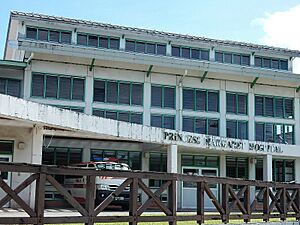
Tuvalu became fully independent in 1978. It became a sovereign state and a constitutional monarchy within the Commonwealth. Elizabeth II became the first Queen of Tuvalu. The country's constitution stated that Queen Elizabeth II was the head of state because the people of Tuvalu wanted her to be.
Princess Margaret, the Queen's sister, visited in September 1978 for the independence celebrations. She became ill, so her secretary, Lord Napier, took her place. On October 1, Lord Napier gave the independence documents to the new Governor-General. He also read a speech from the Princess and a message from the Queen to the people of Tuvalu.
The Tuvaluan Crown: What It Means
Tuvalu is one of 15 independent countries called Commonwealth realms. These countries share the same monarch. However, the monarch's role in Tuvalu is completely separate from their role in any other country, like the United Kingdom. Each Commonwealth realm, including Tuvalu, is independent. The King of Tuvalu is represented in the country by the Governor-General of Tuvalu.
Since Tuvalu became independent in 1978, the Crown has been both shared and separate. The King's role as monarch of Tuvalu is unique. The monarchy is no longer just a British idea; it has become a Tuvaluan one.
This separation is shown in several ways. For example, the King has a special Tuvaluan title. When he acts for Tuvalu, he uses Tuvaluan symbols, like the country's national flag. Also, only Tuvaluan government ministers can advise the King on matters concerning Tuvalu.
In Tuvalu, the government is legally known as the Crown in Right of Tuvalu.
The King's Title
The Royal Style and Title Act 1987, passed by Tuvalu's Parliament, gave Queen Elizabeth II special titles for Tuvalu. Her official title became: Elizabeth the Second, by the Grace of God Queen of Tuvalu and of Her other Realms and Territories, Head of the Commonwealth.
Since King Charles III became monarch, his title is: Charles the Third, by the Grace of God King of Tuvalu and of His other Realms and Territories, Head of the Commonwealth.
This title shows that Tuvalu is an independent monarchy. It highlights the King's role specifically as the King of Tuvalu. It also shows the shared connection with other Commonwealth countries. Usually, the King is simply called "King of Tuvalu" when he is in Tuvalu or doing duties for Tuvalu abroad.
Who Becomes King or Queen Next?

The rules for who becomes the next King or Queen are based on absolute primogeniture. This means the oldest child, regardless of gender, inherits the throne. These rules are set by laws like the Succession to the Crown Act 2013 and older British laws. These laws say that only natural, legitimate descendants of Sophia, Electress of Hanover, can inherit the throne. They also state that the monarch cannot be a Roman Catholic and must be part of the Church of England.
Even though these laws are controlled by the British Parliament, neither the UK nor Tuvalu can change them without all the other Commonwealth realms agreeing. This is like a special agreement between these countries.
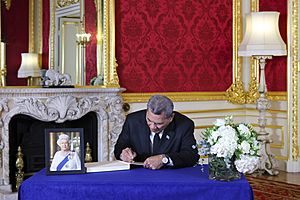
When a monarch dies or steps down, their heir immediately becomes the new monarch. There is no need for a special ceremony to confirm it. After a monarch passes away, there is a period of mourning. Flags across the country are flown at half-mast to show respect. A public memorial service is usually held.
The King as a Symbol of Tuvalu
I, (name), do swear (or solemnly affirm) that I will be faithful and bear true allegiance to the Sovereign of Tuvalu. (So help me God)
Section 51 of the Constitution of Tuvalu says that the head of state (the King) is a symbol of Tuvalu's unity and identity. Sections 52 and 53 explain what the head of state does.
Many government workers and new citizens in Tuvalu take an oath of loyalty to the King. This is because the King, during his Coronation, promises to govern the people of his realms according to their laws and customs.
The King's Role in Government
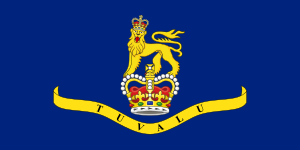
Tuvalu's constitution sets up a parliamentary system under a constitutional monarchy. This means the King and Governor-General have legal and practical roles, but they are not involved in politics. The Crown is seen as a body where different parts share power, with the King at the center. All government powers are officially held by the King. The government of Tuvalu is formally called His Majesty's Government.
Most of the King's duties in Tuvalu are carried out by the Governor-General. The King appoints the Governor-General based on the advice of Tuvalu's prime minister.
Running the Government
Part V, section 62 of the Constitution of Tuvalu explains where the power to run the government comes from:
- (1) The main power to run Tuvalu's government belongs to the King, and to the Governor-General as the King's representative.
- (2) This power is used according to section 53 (how the Head of State performs duties).
The prime minister, who leads the Cabinet of Tuvalu, advises the King or Governor-General on how to use their powers. The King's role is mostly symbolic. He represents the legal authority for all government actions. The Cabinet decides how to use the King's special powers, like declaring war or calling elections.
However, these special powers belong to the Crown, not to the ministers. The constitution allows the Governor-General to use these powers on their own in rare situations, such as dismissing a prime minister or dissolving parliament. The King also has a few specific duties, like appointing the Governor-General.
The prime minister is chosen by the Parliament of Tuvalu. The Governor-General calls a meeting of parliament to elect a new prime minister after each general election or if the position becomes empty. The Governor-General appoints a Cabinet based on the prime minister's choices. The King is kept informed about these changes by his representative. Many other officials, like judges, are also appointed by the Crown.
Dealing with Other Countries
The King's special powers also extend to foreign affairs. The Governor-General signs treaties and international agreements. Parliament's approval is not needed for these. However, a treaty cannot change Tuvalu's laws without an act of Parliament. The Governor-General, on behalf of the King, also sends Tuvaluan ambassadors to other countries and welcomes diplomats from foreign states.
Also, Tuvaluan passports are issued in the King's name. The first page of a Tuvaluan passport says:
"The Governor-General of Tuvalu hereby requests and requires in the name of His Majesty King Charles the Third all those whom it may concern to allow the holder of this passport to pass freely, without hindrance or delay, and in case of need to give the holder all lawful aid and protection. The holder of this passport has the right to enter and reside in Tuvalu."
The King and Parliament
The Governor-General is responsible for calling meetings of the Parliament of Tuvalu, following the Cabinet's advice. If parliament does not meet often enough, the Governor-General can call it back into session. A new parliamentary session begins with a speech from the Governor-General, which explains the government's plans for new laws.
The Governor-General also ends parliamentary sessions. Parliament automatically ends four years after the first meeting after a general election. The Governor-General can end parliament earlier if parliament votes for it, or if there is no prime minister and no one has been elected within a reasonable time. After parliament ends, a general election is held.
All executive power belongs to the King, so his approval is needed for bills to become laws. Section 88 of the constitution requires the Governor-General to "promptly assent" to a bill, meaning they must approve it without delay.
The King and the Courts
All judges of the High Court of Tuvalu are appointed by the Governor-General. The highest court for appeals in Tuvalu is the Judicial Committee of the King's Privy Council.
In Tuvalu, crimes are seen as offenses against the King. Legal cases for serious crimes are brought in the King's name, for example, Rex [or Regina] versus [Name] (rex means king, regina means queen). The law says the King "can do no wrong," meaning he cannot be charged with crimes in his own courts.
The King, and by extension the Governor-General, can also grant protection from being charged with a crime. They can also pardon people who have committed offenses against the Crown, either before, during, or after a trial. This power to grant mercy is described in section 82 of the constitution.
Cultural Role of the Monarchy
- The Queen's 90th birthday parade in Tuvalu, 2016
The King's Official Birthday is a public holiday in Tuvalu. It is usually celebrated on the second Saturday of June each year. Tuvaluans celebrate with church services, prayers, singing God Save The King and Tuvalu mo te Atua, flag hoisting, speeches, and a parade. Since it's a public holiday, government offices, schools, and most businesses are closed.
Tuvaluans also used to celebrate the birthday of the former Prince of Wales (now King Charles III) as a public holiday in November.
Awards and Honours
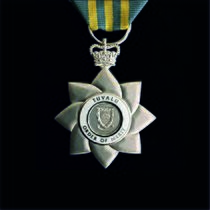
The King is seen as the source of all awards and honours. He gives out awards and honours in Tuvalu in his name. Most of these are given based on the advice of Tuvalu's government ministers.
Special ceremonies to give out these awards are done by the Governor-General on behalf of the King.
The King and the Police Force
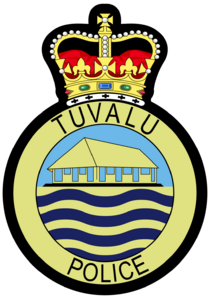
The patrol boats of the Tuvalu Police Force are called HMTSS (His Majesty's Tuvalu Surveillance Ship). A St. Edward's Crown appears on the police force's badges and rank symbols. This shows that the monarchy is the source of their authority.
Under Section 163(5) of the Constitution, the Commissioner of Police is appointed by the Head of State, following the advice of the Cabinet. Every member of the Tuvalu Police Force must swear loyalty to the King of Tuvalu. The current oath is:
"I, [name], do swear by Almighty God (or solemnly and sincerely affirm) that I will well and truly that I will be faithful and bear true allegiance to His Majesty King Charles the Third, His Heirs and Successors, and that I will faithfully serve His Majesty the King, His Heirs and Successors, during my service in the Tuvalu Police Force: that I will subject myself to all Acts, orders and regulations relating to the said Police now in force or which may from time to time be in force and will discharge all the duties of a police officer according to law, without fear or favour, affection or ill-will."
Royal Visits to Tuvalu
Prince Philip, Duke of Edinburgh, was the first member of the royal family to visit the islands in 1959. Prince Charles, Prince of Wales, visited in October 1970.
Princess Margaret arrived in September 1978 for the independence celebrations, but she had to leave early due to illness.
Queen Elizabeth II and the Duke of Edinburgh visited Tuvalu from October 26 to 27, 1982. The royal couple were carried in special ceremonial chairs. They also enjoyed traditional local dishes at a banquet. They laid the first stone for a future Parliament building. Special stamps were made to remember this royal visit.
In 2012, the Duke and Duchess of Cambridge visited Tuvalu to celebrate the Queen's Diamond Jubilee. They toured many places. Dressed in colorful grass skirts, they also took part in traditional dancing.
Votes on Keeping the Monarchy
In February 1986, Tuvalu held a country-wide vote. People were asked if Tuvalu should stay a constitutional monarchy with the Queen as head of state, or become a republic (with a president). Only one island wanted to become a republic. More than 90% of voters wanted to keep the monarchy.
In the early 2000s, there was a discussion about getting rid of the monarchy. Prime Minister Saufatu Sopoanga said in 2004 that he wanted to replace the Queen as Tuvalu's head of state. Other former prime ministers agreed with him. Sopoanga said they would check public opinion first. A vote was held in 2008. The monarchy was kept, with 1,260 votes for keeping it and 679 votes against (64.98%).
Public Opinion
A survey in 2023 found that 71% of people wanted to keep the monarchy. Only 26% preferred Tuvalu to become a republic.
List of Tuvaluan Monarchs
| Portrait | Regnal name (Born–Died) |
Reign over Tuvalu | Full name | Consort | House | |
|---|---|---|---|---|---|---|
| Start | End | |||||
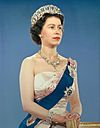 |
Elizabeth II (1926–2022) |
1 October 1978 | 8 September 2022 | Elizabeth Alexandra Mary | Philip Mountbatten | Windsor |
| Governors-general: Sir Fiatau Penitala Teo, Sir Tupua Leupena, Sir Toaripi Lauti, Sir Tomu Sione, Sir Tulaga Manuella, Sir Tomasi Puapua, Faimalaga Luka, Sir Filoimea Telito, Sir Iakoba Italeli, Sir Tofiga Vaevalu Falani Prime ministers: Toaripi Lauti, Tomasi Puapua, Bikenibeu Paeniu, Kamuta Latasi, Ionatana Ionatana, Faimalaga Luka, Koloa Talake, Saufatu Sopoanga, Maatia Toafa, Apisai Ielemia, Willy Telavi, Enele Sopoaga, Kausea Natano |
||||||
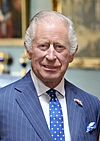 |
Charles III (b. 1948) |
8 September 2022 | present | Charles Philip Arthur George | Queen Camilla | Windsor |
| Governors-general: Sir Tofiga Vaevalu Falani Prime ministers: Kausea Natano, Feleti Teo |
||||||
See also
- Lists of office-holders
- Monarchies in Oceania
- List of monarchies



